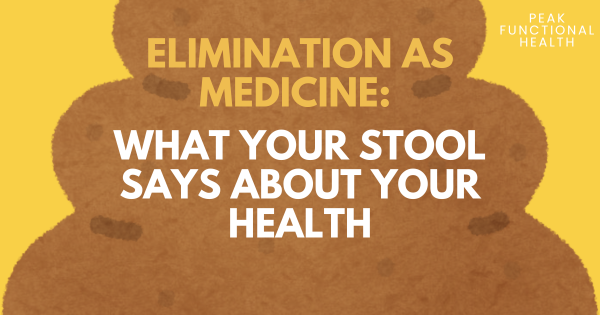Elimination as Medicine: What Your Stool Says About Your Health

Why Stool Is a Vital Sign in Chronic Disease Recovery
When people talk about healing, they often think about supplements, superfoods, or special protocols. But there's one core function that’s often overlooked, and it might just be the most important: poop.
As awkward as it can be to talk about, the truth is that stool is a vital sign. It gives us a direct look into what’s happening inside the body, from how well you're digesting food to whether your body is clearing out what it no longer needs. And when it's not happening regularly or properly, it creates a serious backup both literally and metabolically.
Poop: A Core Basic, Not an Afterthought
Alongside sleep and blood sugar regulation, poop forms part of the "Non-Negotiable Trifecta." That means if your poop is off, it’s a clue that something deeper is going on, often with digestion, inflammation, or the immune system.
No matter how great your supplements are or how perfectly you eat, if you’re not pooping well, your body isn’t clearing waste. That waste gets recirculated, reabsorbed, or stored—especially when it comes to toxins or excess hormones that need to be eliminated. Poop is the final step of detox, and without it, the terrain surrounding the roots of our symptoms can’t improve.
What Poop Tells Us
Stool is made up mostly of water and bacteria, with a mix of undigested food, fiber, bile, and cells the body has sloughed off. And its composition, frequency, and consistency tell us a lot.
Frequency matters. If you're eating three meals a day, it’s ideal to see one to three bowel movements daily. Anything less may suggest that things are moving too slowly, and toxins may be reabsorbing.
Visual clues are key. Color changes, visible food particles, mucus, or undigested fat can point to specific imbalances. For example, dark stool might signal slow transit or bile issues, while green stool could be from lots of leafy greens (or a bile dump). Undigested food suggests poor breakdown and absorption upstream.
Consistency counts. The Bristol Stool Chart helps us determine whether the stool is well-formed, loose, or hard—all of which reflect how digestion and hydration are working.
Looking at poop may not feel glamorous, but it’s one of the most accessible forms of data we have. As functional practitioners, we often ask clients to track their food, mood, and poop to draw connections between diet, emotions, and digestive output, and commonly find interesting ties between them.
In fact, bowel dysfunction is one of the most common concerns clients bring up, and it usually shows up as either constipation or diarrhea. These aren't just symptoms to patch over; they’re signals pointing to deeper root issues.
Constipation is often a mix of dehydration, low fiber, microbial imbalances, inflammation, or stress. It can lead to straining, hemorrhoids, and toxin retention. For many people, colonics or magnesium may help jump-start movement, but long-term healing focuses on digestion, gut lining repair, and microbial balance. An impaired colon can’t carry out toxins, excess hormones, or metabolic waste. And if those substances aren’t excreted, they stay in circulation, making you feel tired, inflamed, bloated, or worse.
Diarrhea is the body’s attempt to flush something out quickly. That might be infection, inflammation, or certain foods. It’s common in people with IBS, SIBO, or IBD. If chronic, it may need medical investigation. Too loose of stools or an overly fast transit time does not give the gut the chance to do a thorough job of nutrient absorption.
Getting Things Regular
If you’re not pooping well, here’s some ideas to start at home:
Hydration: Enough water, especially when fiber intake increases, is essential.
Fiber: From whole foods, not just powders. Think veggies, flax, chia, and legumes (as tolerated).
Chewing: It sets the tone for the entire digestive process. Slower eating helps, too
Movement: Gentle exercise and walking can help stimulate peristalsis, the rhythmic motion that encourages food through the digestive process.
Stress: Ensure you shift into rest and digest mode when eating, giving your body the signal to process food properly.
Poop Isn’t Optional
In Functional Nutrition, poop is a vital conversation. It might not be something people bring up first, but once we open the door, it often becomes the breakthrough.
It’s the goal isn't just about comfort or regularity. It’s about helping the body complete a natural process that’s happening every single day to defend your health.
Even without coaching, many find it helpful to track their patterns against food intake and other factors to get a better understanding of what might be going inside a critical path to detoxification.
If you suspect something's off with your bathroom routine, let us help you uncover the root causes that could be contributing.
Stay in touch!
Subscribe to our newsletter for periodic updates, special offers, and education!
Thank you for subscribing!
Have a great day!